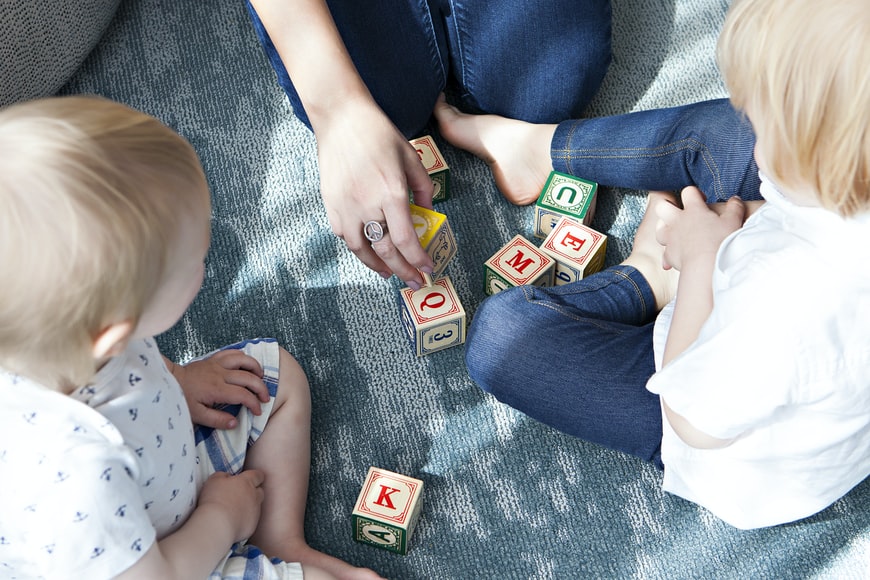Every parent’s been there – after a busy day at work, you’re finally home. You made dinner, fed the kids, and cleaned the kitchen. Now you go to sit down on the couch when you hear a little voice say, “Mama, will you play with me?”
Do you feel like playing with your child right now? Probably not. If anything, playing feels like another chore. However, you know that playing is beneficial for your little one. Here are five more reasons why you should invest in playing with your children. Hint: one of the reasons is helpful for adults!
1. Play Benefits Cognitive Development
When you play with your child, you help them develop cognitive skills like problem-solving and critical thinking. Children build memory and learn cause-and-effect relationships through play. The act of unstructured play lights up a child’s senses and fosters curiosity and exploration – crucial skills in cognitive processing. Creative play and imaginative pretend play allow a child to use critical thinking skills and brainstorm.
Try engaging your child in imaginative, unstructured play. Go outside to play together and have an adventure in a park or the backyard. Do a craft together or create a tower out of blocks or Legos.
2. Play Boosts a Child’s Self Esteem
If you engage your child in play, you give them a dramatic boost to their confidence and help them build their self-esteem. Play is a powerful tool in assisting children in processing and understanding their emotions. When your child loses a game, they may feel angry, sad, or upset.
Allow your child to articulate what they feel, and don’t shame them for their emotions. If a child can identify a feeling and explain why it’s making them feel a particular way, they’re more likely to process it appropriately. Modeling the appropriate method for your child to process their feelings will help them further.
3. Play Strengthens Social Skills
When you play with your child, they notice how you act and pick up on your social cues. By observing your signals and reacting, they’re on their way to developing empathy. You can further help them cultivate this skill by pointing out how you’re feeling and asking your child if they’ve ever felt that way before.
Another benefit of social play is that it requires people with differing views to come together and compromise to reach a common goal. This works particularly well in unstructured play when your child is in charge of how the game works. Guide them as needed to make social connections – play is a great way to strengthen your relationship with your child.
4. Play Develops Fine & Gross Motor Skills
Play is physically beneficial to children because it supports the development of fine and gross motor skills.
Fine Motor Skills
Fine motor skills are small movements, typically with our hands and wrists. Some examples of fine motor skills include:
- Writing with a pencil
- Using scissors
- Typing on a keyboard
- Brushing teeth
Though the movements are small, they are pretty complex, requiring muscles and your brain to complete the task. As you age, fine motor skills become simple, but they can be pretty challenging when you’re young.
Help your child develop their fine motor skills by engaging them in play with play dough or slime. Have them cut the dough or slime in half with scissors or have them pinch it together with their fingers. Another fun activity is to paint together. Get paintbrushes and work on holding and painting with the brush. You can also fingerpaint together.
The different styles encourage different levels of control, but all work to grow your child’s fine motor skills.
Gross Motor Skills
Gross motor skills encompass the more significant body movements made by muscles in the torso, arms, and legs. Some examples of this skill include:
- Walking
- Running
- Catching and throwing
- Hopping
- Climbing
If you struggle with gross motor skills, you might find basic body awareness, balance, and coordination challenging. When born, infants lack gross motor skills. Through exploration and play, they gain these skills.
To help your child improve their gross motor skills, consider routinely taking them to a playground. Unstable playground equipment, like wobble bridges or rope ladders, dramatically enhances a child’s balance and strengthens their core muscles. Swings also provide good practice with balance and coordination.
Another option to consider is to purchase a mini trampoline for at-home use. Having a personal trampoline can be incredibly beneficial for your child to help with their balance, improve their gross motor skills, and provide helpful sensory input.
5. Play Is Good for Adults
Finally, play is good for you, too! Scientists have found that whenever parents engage in play with their child, the hormone oxytocin is released. Oxytocin works to strengthen the bond between you and your child, deepening the trust in your relationship. The hormone also reduces stress and lowers blood pressure, anxiety, and fear.
At the end of a stressful workday, you may feel too tired to play with your kiddo. But know it’s as beneficial for you as is it for your child.
Play With Your Kids Today
How will you choose to play with your little one? Let your child lead, and ask them what they would prefer to do. The benefits are myriad – so play with your child today!

